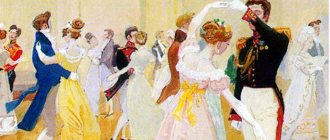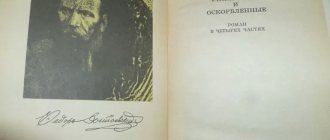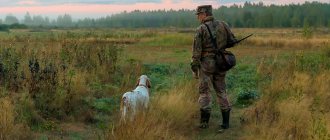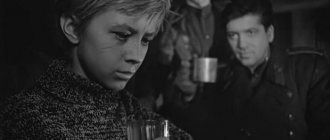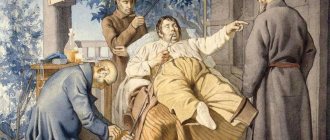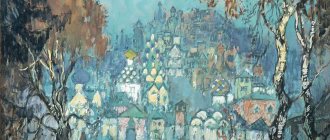“Ivan Susanin” very brief summary
M. I. Glinka’s opera “Ivan Susanin” for children, summary for the reader’s diary:
Polish soldiers are looking for the heir to the Russian throne, Mikhail, to kill him. The peasant Ivan Susanin undertakes to lead them, and leads the army into the impassable wilderness to certain death.
Bad weather is raging, high snowdrifts lie everywhere. A detachment of Polish soldiers is searching for Mikhail Romanov, the rightful heir to the Russian throne. Their guide, peasant Ivan Susanin, brings the Poles to his house to spend the night. He sets a lavish table, and when the soldiers fall asleep, he prays for the salvation of the young king.
At night, Susanin’s son appears and wants to hide his father in a safe place. He reminds Ivan that his life is dear to his wife and children. The old man refuses to be saved and begs his son to warn Tsarevich Mikhail about the impending danger.
By morning the storm subsides, and the Poles get ready to hit the road again. Susanin leads them through the forest and leads them into an impassable thicket, where the trees stand like a solid wall. The soldiers follow the guide all day long. As a result, they realize that Susanin has lured them into a trap. They demand that he immediately take them out of the forest. The soldiers threaten the old man with terrible reprisals, but Susanin is calm. His conscience is clear - he did everything to protect the young heir from a terrible fate.
Before his death, Susanin makes a speech that he does not mind giving his own life for the sake of the Fatherland and the Tsar. The hero dies at the hands of his enemies, but his death is not in vain. Soon, on Red Square, people celebrate the liberation from the invaders and praise the heroes.
Conclusion:
The opera teaches true patriotism, expressed in commitment to the native land and intransigence towards its invaders. The Russian peasant and warrior derive their strength from family ties, which are as strong as the inextricable connection of the Russian soul with the Motherland.
Interesting: Bizet's opera "Carmen" was written in 1875. To better prepare for a literature lesson, we recommend reading a summary of “Carmen.” The libretto for the musical work was written based on the short story of the same name by Prosper Merimee, in the center of which was Jose’s passionate, dramatic love for a beautiful gypsy.
Summary of Ryleev Ivan Susanin
Susanin sets the table for the soldiers, sets out a generous meal, pours beer and wine.
Tired and frozen in the cold, the Poles soon fall asleep soundly. Only the owner does not sleep, he prays for the salvation of the young king. But suddenly he hears the sound of hooves; a horseman has arrived at the gate of the house. Susanin comes out and sees his son, who wants to pick up his father and take him to a safe place. The young man reminds his father that his wife and children need his life. But the old man refuses to save himself and persuades his son to gallop to Tsarevich Mikhail and warn him of the danger. With tears in his eyes, young Susanin leaves. During the night the storm subsides, morning comes, the Poles wake up and get ready to set off again. The guide leads them through the forest and leads them into an impenetrable thicket, where there is not a single path, and the trees stand like a solid wall. The soldiers walk all day and eventually realize that they have fallen into a trap. They threaten the old man with death if he does not lead them out of the forest. But the hero replies that his main task was to save the Russian prince, who is now safe. Realizing that he does not have long to live, the old man with a calm heart prepares to die.
Before his death, Susanin makes a speech that he is not afraid to give his life, he is even glad about it, because he is dying for his Fatherland and his Tsar. The Poles expected to find a traitor in him, but they were mistaken, because Russian people have loved their Motherland since childhood and never betray it. And if necessary, they gladly give their lives for a just cause.
Angry soldiers attack Susanin and kill him. The old man falls under their sabers onto the white snow, which immediately turns red with blood. But this blood saved the country’s rightful king.
You can use this text for a reader's diary
A short retelling of “Ivan Susanin”
Summary of “Ivan Susanin” Glinka’s opera:
The militia return to the village of Domnino with good news - victory over the hated Poles. Only Antonida, who is waiting for the imminent return of Bogdan Sobinin, her fiancé, who has gone to fight the Polish gentry, has no time for joyful rejoicing. Susanin shares his daughter’s feelings, but sets her up for imminent and difficult trials: is it before the wedding now, when there is so much turbulence around.
A song coming from the river announces the arrival of Sobinin and his retinue. Bogdan knows that Pozharsky and Minin have taken the lead in the Russian army and are gathering Russian soldiers around them. The rejoicing of the peasants knows no bounds: liberation is imminent.
But Sobinin is upset that his wedding with Antonida has been postponed; wasn’t it for the sake of the bride that he was in such a hurry to return to his native land! After the news of the siege of enemy troops in Moscow, Susanin changes his mind and gives his paternal consent to his daughter’s wedding.
The Polish king Sigismund the Third is so confident in the victory of the Polish army that even before the outcome of the battle he begins a feast in his honor. A messenger appears in a hall filled with cheerful guests with the news of the complete defeat of the gentry and the Poles from the royal army captured in Moscow. Sigismund gives the order to the knights to prepare for a military campaign. Boasting their courage, with weapons in their hands, they vow to defeat the Russian “smerds”.
In the midst of preparations for the wedding of Sobinin and Antonida, the Poles break into the house of Ivan Susanin. They insist that they be given a guide to Moscow, because local roads are unknown to them. Susanin could accompany them, but he is not a traitor and even for the Polish gold promised to him, he does not agree to help the enemies.
After some thought, Susanin comes up with a mental plan: he needs to lure the Polish enemies into the impassable wilderness of the forest and leave them there to die. The peasant, out of appearance, agrees to accompany the Poles to Moscow, realizing that this is his last journey: his enemies will not forgive him for such treachery and will kill him in the same forest...
Secretly from the Poles, he sends his son Vanya to Minin to warn him about the threat from Sigismund. Vanya happily fulfills his father’s last request, because he dreams of fighting the Poles and even wanted to ask to join Sobinin’s squad.
Ivan Susanin leads the Polish gentry through fields and swamps, through difficult forests. Having learned about Ivan's cunning, Sobinin tries to pursue his enemies in the hope of saving the father of his bride. Minin leads this pursuit and, together with Sobinin’s squad, advances towards the unsuspecting Poles.
The cold, hungry and exhausted Poles begin to suspect that Susanin is leading them down the wrong paths. Having stopped for a rest, the enemies are fast asleep. But Ivan cannot sleep: he mentally says goodbye to his family and his life, which his enemies will definitely not save for him.
No matter how painful his death was, Susanin is warmed by the thought of fulfilling his duty to his native land: to give his life for the Tsar is an honor for a Russian peasant. In the last whistle of the wind through the snowstorm, he imagines the voices of his beloved daughter and son, because it is for their sake that he is here and now - how could it be otherwise...
The next morning, the triumphant Susanin reveals to the Poles the terrible truth that they are destined to rot in the forest thicket, because Ivan will not lead them to Moscow! The enraged Poles kill Susanin in a rage and only then realize that they cannot get out of the local forests without the peasant - they are doomed...
And on Red Square in Moscow, the people greet the Russian squads with special jubilation. Everyone shares this joy: Vanya, And Antonida, and Sobinin - only Ivan Susanin is not around... Moscow celebrates the liberation from the Polish invaders and glorifies the national heroes who did not spare their lives for the sake of victory over the enemy.
This is interesting: “Pagliacci,” the opera by R. Leoncavallo, which premiered in 1892, so fully expressed all the ideas of Italian verismo that this innovative movement in its pure form never produced anything of similar strength and beauty. A summary of “Pagliacci” can be read on our website. The main achievement of this opera lies in the music: Canio's arioso is one of the most famous melodies in the world.
Read summary Ivan Susanin - opera
The militia return to the village of Domnino with good news - victory over the hated Poles. Only Antonida, who is waiting for the imminent return of Bogdan Sobinin, her fiancé, who has gone to fight the Polish gentry, has no time for joyful rejoicing. Susanin shares his daughter’s feelings, but sets her up for imminent and difficult trials: is it before the wedding now, when there is so much turbulence around. A song coming from the river announces the arrival of Sobinin and his retinue. Bogdan knows that Pozharsky and Minin have taken the lead in the Russian army and are gathering Russian soldiers around them. The rejoicing of the peasants knows no bounds: liberation is imminent.
But Sobinin is upset that his wedding with Antonida has been postponed; wasn’t it for the sake of the bride that he was in such a hurry to return to his native land! After the news of the siege of enemy troops in Moscow, Susanin changes his mind and gives his paternal consent to his daughter’s wedding.
The Polish king Sigismund the Third is so confident in the victory of the Polish army that even before the outcome of the battle he begins a feast in his honor. A messenger appears in a hall filled with cheerful guests with the news of the complete defeat of the gentry and the Poles from the royal army captured in Moscow. Sigismund gives the order to the knights to prepare for a military campaign. Boasting their courage, with weapons in their hands, they vow to defeat the Russian “smerds”.
In the midst of preparations for the wedding of Sobinin and Antonida, the Poles break into the house of Ivan Susanin. They insist that they be given a guide to Moscow, because local roads are unknown to them. Susanin could accompany them, but he is not a traitor and even for the Polish gold promised to him, he does not agree to help the enemies. After some thought, Susanin comes up with a mental plan: he needs to lure the Polish enemies into the impassable wilderness of the forest and leave them there to die. The peasant, out of appearance, agrees to accompany the Poles to Moscow, realizing that this is his last journey: his enemies will not forgive him for such treachery and will kill him in the same forest...
Secretly from the Poles, he sends his son Vanya to Minin to warn him about the threat from Sigismund. Vanya happily fulfills his father’s last request, because he dreams of fighting the Poles and even wanted to ask to join Sobinin’s squad. Ivan Susanin leads the Polish gentry through fields and swamps, through difficult forests. Having learned about Ivan's cunning, Sobinin tries to pursue his enemies in the hope of saving the father of his bride. Minin leads this pursuit and, together with Sobinin’s squad, advances towards the unsuspecting Poles.
The cold, hungry and exhausted Poles begin to suspect that Susanin is leading them down the wrong paths. Having stopped for a rest, the enemies are fast asleep. But Ivan cannot sleep: he mentally says goodbye to his family and his life, which his enemies will definitely not save for him. No matter how painful his death was, Susanin is warmed by the thought of fulfilling his duty to his native land: giving his life for the Tsar is an honor for a Russian peasant. In the last whistle of the wind through the snowstorm, he imagines the voices of his beloved daughter and son, because it is for their sake that he is here and now - how could it be otherwise...
The next morning, the triumphant Susanin reveals to the Poles the terrible truth that they are destined to rot in the forest thicket, because Ivan will not lead them to Moscow! The enraged Poles kill Susanin in a rage and only then realize that they cannot get out of the local forests without the peasant - they are doomed...
And on Red Square in Moscow, the people greet the Russian squads with special jubilation. Everyone shares this joy: Vanya, And Antonida, and Sobinin - only Ivan Susanin is not around... Moscow celebrates the liberation from the Polish invaders and glorifies the national heroes who did not spare their lives for the sake of victory over the enemy.
Rate this piece:
- 3.99
Votes: 210
Read summary Glinka - Ivan Susanin. Brief retelling. For a reader's diary, take 5-6 sentences
The plot of the opera "Ivan Susanin" by action
“Ivan Susanin” opera summary of the work by action:
Act one
In a small village live a simple peasant Ivan Susanin and his two children: his own daughter Antonida and his adopted son Vanya. The news of the attack by the Polish army stirs up the people, who are not going to give up their homeland to the enemy without a fight - “Whoever dares to attack Rus' will find death.” Bogdan, together with other young and strong peasants, join the people's militia.
After a while, he brings home the good news - the peasant Minin from Nizhny Novgorod is gathering a great squad to defeat the Poles and liberate the capital from the invaders. Antonida and Bogdan turn to Ivan Susanin to give a blessing for their wedding, but the old man refuses the lovers’ request: “Nowadays there is no time for weddings. It's battle time!
Act two
Meanwhile, Sigismund III throws a luxurious ball in honor of his victory. Inspired by military success, the Poles are looking forward to a heavenly life at the expense of looted wealth.
During the general rejoicing, the ambassador brings bad news to the king. The Russians, led by Minin, resist the Poles. The Polish detachment is besieged in Moscow, and the remaining army flees in panic.
Act three
Vanya makes himself a wooden spear, dreaming of growing up quickly and defending his homeland. Susanin enters the hut and reports that Minin and his retinue have set up camp nearby in the forest.
Bogdan and Antonida are busy preparing for their long-awaited wedding. Peasants come to the Susanins' house to congratulate the future newlyweds. When the guests leave, Polish soldiers suddenly burst into the hallway and demand the old man to take them to Minin.
At first, the peasant refuses, but then an insidious plan matures in his head - to deceive the Poles into the wilderness of the forest and destroy them there. He quietly instructs Vanya to rush as quickly as possible to the militia and warn of the danger, while he himself leads the enemies into the forest.
When Antonida’s friends come to the hut, the tearful girl tells them about the misfortune that has happened. Bogdan and the peasants go to help Susanin.
Act four
Late at night, Vanya resorts to the militia and informs Minin about the Polish attack. The alarmed warriors immediately prepare to go on a campaign. Meanwhile, Susanin leads the enemies further and further into the impenetrable forest thicket. The old man realizes that his time is near and mentally says goodbye to the children.
Tired Poles suspect something is wrong. They ask Susanin where he has taken them, to which the brave peasant replies that he has taken them to a place where they will have to “die by starvation.” In anger, the Poles kill Susanin.
Epilogue
Jubilant crowds of people rush to Red Square, church bells deafen the area with festive ringing. Among the joyful people, the sad Antonida, Bogdan and Vanya stand out. One of the warriors asks about the reason for their sadness, to which Vanya tells him about the heroic deed of his father.
The soldiers console the boy with the words: “Ivan Susanin will live forever in the people’s memory.” The people welcome the appearance of their heroes - Minin and Pozharsky, and sing songs of praise addressed to them.
Conclusion
Glinka's opera glorifies the heroism and self-sacrifice of a simple Russian peasant who did not spare his own life for the sake of his people.
Interesting: “Tosca” is an opera by Giacomo Puccini in three acts to a libretto by L. Illica and G. Giacosa based on the drama of the same name by V. Sardou (1887). On our website you can read a summary of the opera “Tosca” and get acquainted with the plot of the work in abbreviation. The premiere took place on January 14, 1900 at the Teatro Costanzi in Rome.
Summary
Act one
In a small village live a simple peasant Ivan Susanin and his two children: his own daughter Antonida and his adopted son Vanya. The news of the attack by the Polish army stirs up the people, who are not going to give up their homeland to the enemy without a fight - “Whoever dares to attack Rus' will find death.”
Bogdan, together with other young and strong peasants, join the people's militia. After a while, he brings home good news: the peasant Minin from Nizhny Novgorod is gathering a great squad to defeat the Poles and liberate the capital from the invaders.
- Ivan Susanin short. Opera Ivan Susanin short summary for children
Antonida and Bogdan turn to Ivan Susanin to give a blessing for their wedding, but the old man refuses the lovers’ request: “Nowadays there is no time for weddings. It's battle time!
Act two
Meanwhile, Sigismund III throws a luxurious ball in honor of his victory. Inspired by military success, the Poles are looking forward to a heavenly life at the expense of looted wealth.
During the general rejoicing, the ambassador brings bad news to the king. The Russians, led by Minin, resist the Poles. The Polish detachment is besieged in Moscow, and the remaining army flees in panic.
Act three
Vanya makes himself a wooden spear, dreaming of growing up quickly and defending his homeland. Susanin enters the hut and reports that Minin and his retinue have set up camp nearby in the forest.
Bogdan and Antonida are busy preparing for their long-awaited wedding. Peasants come to the Susanins' house to congratulate the future newlyweds. When the guests leave, Polish soldiers suddenly burst into the hallway and demand the old man to take them to Minin.
At first, the peasant refuses, but then an insidious plan matures in his head: to deceive the Poles into the wilderness of the forest and destroy them there. He quietly instructs Vanya: to rush as quickly as possible to the militia and warn of the danger, while he himself leads the enemies into the forest.
When Antonida’s friends come to the hut, the tearful girl tells them about the misfortune that has happened. Bogdan and the peasants go to help Susanin.
Act four
Late at night, Vanya runs to the militia and informs Minin about the Polish attack. The alarmed warriors immediately prepare to go on a campaign.
Meanwhile, Susanin leads the enemies further and further into the impenetrable forest thicket. The old man realizes that his time is near and mentally says goodbye to the children.
- Chaikovsky
Tired Poles suspect something is wrong. They ask Susanin where he has taken them, to which the brave peasant replies that he has taken them to a place where they will have to “die by starvation.” In anger, the Poles kill Susanin.
Epilogue
Jubilant crowds of people rush to Red Square, church bells deafen the area with festive ringing. Among the joyful people, the sad ones Antonida, Bogdan and Vanya stand out.
One of the warriors asks about the reason for their sadness, to which Vanya tells him about the heroic deed of his father. The soldiers console the boy with the words: “Ivan Susanin will live forever in the people’s memory.”
The people welcome the appearance of their heroes - Minin and Pozharsky - and sing songs of praise addressed to them.
Very briefly
Bad weather is raging, high snowdrifts lie everywhere. A detachment of Polish soldiers is searching for Mikhail Romanov, the rightful heir to the Russian throne. Their guide, peasant Ivan Susanin, brings the Poles to his house to spend the night. He sets a lavish table, and when the soldiers fall asleep, he prays for the salvation of the young king.
At night, Susanin’s son appears and wants to hide his father in a safe place. He reminds Ivan that his life is dear to his wife and children. The old man refuses to be saved and begs his son to warn Tsarevich Mikhail about the impending danger.
By morning the storm subsides, and the Poles get ready to hit the road again. Susanin leads them through the forest and leads them into an impassable thicket, where the trees stand like a solid wall. The soldiers follow the guide all day long. As a result, they realize that Susanin has lured them into a trap. They demand that he immediately take them out of the forest. The soldiers threaten the old man with terrible reprisals, but Susanin is calm. His conscience is clear - he did everything to protect the young heir from a terrible fate.
Before his death, Susanin makes a speech that he does not mind giving his own life for the sake of the Fatherland and the Tsar. The hero dies at the hands of his enemies, but his death is not in vain. Soon, on Red Square, people celebrate the liberation from the invaders and praise the heroes.
"Ivan Susanin"
The formation of the image of the main character of the opera was greatly influenced by the poem by K. Ryleev - “Ivan Susanin”. The creator of the libretto of the opera “Ivan Susanin” is G. F. Rosen. The premiere took place in St. Petersburg at the Bolshoi Theater on November 27, 1836. The production was enthusiastically received by the progressive intelligentsia, who saw in the creation of the opera “Ivan Susanin” the beginning of a new stage in the development of Russian music. The court aristocracy did not share their delight, although the emperor himself was present at the premiere. At the request of Nicholas I, Glinka’s opera “Ivan Susanin” was renamed “A Life for the Tsar” so that it would have a monarchical overtone.
After the collapse of the monarchy, it again began to be called “Ivan Susanin”. Rosen's libretto was revised by the poet S. M. Gorodetsky. First Act The excited and dynamic music of the overture anticipates the dramatic plot of the summary of the opera “Ivan Susanin”.
“Ivan Susanin”: a summary of the opera and the history of its creation
But they will be able to resist the Poles and protect the sovereign from a similar fate. The peasants who entered wish Ivan happiness. After they leave, there is a scene of Susanin blessing the newlyweds. Suddenly a horse's tramp is heard. These are Poles. They demand to be taken to the Tsar, since they think that the Tsar is hiding somewhere nearby, and promise Ivan Susanin gold.
He agrees, quietly telling Vanya to notify the sovereign of the danger. Antonida, thinking that her father was really seduced by money, begs him not to do this. But her father blesses her and orders her to celebrate the wedding without him. After that he leaves. Antonida cries bitterly. From the summary of the opera “Ivan Susanin” it is already clear: the main character is no longer destined to return home. Sobinin, who arrived, is perplexed where the enemies came from. After listening to the bride's story, he gathers a detachment of peasants to free Ivan Susanin. The news of the attack by the Polish army stirs up the people, who are not going to give up their homeland to the enemy without a fight - “Whoever dares to attack Rus' will find death.” Bogdan, together with other young and strong peasants, join the people's militia. After a while, he brings home the good news - the peasant Minin from Nizhny Novgorod is gathering a great squad to defeat the Poles and liberate the capital from the invaders.
Antonida and Bogdan turn to Ivan Susanin to give a blessing for their wedding, but the old man refuses the lovers’ request: “Nowadays there is no time for weddings. It's battle time! Act two Meanwhile, Sigismund III throws a luxurious ball in honor of his victory. Inspired by military success, the Poles are looking forward to a heavenly life at the expense of looted wealth.
During the general rejoicing, the ambassador brings bad news to the king. The Russians, led by Minin, resist the Poles.
Opera Ivan Susanin story for children
M.I. Glinka's opera “Ivan Susanin” (Life for the Tsar)
“A Life for the Tsar” or, as it is also called, “Ivan Susanin” deserves recognition as the first Russian national opera. It has become a property of Russian art on a global scale; it is the first Russian opera to receive recognition throughout the world. Despite the fact that several operatic works were written before Ivan Susanin, they did not gain such popularity. Perhaps because the composers who wrote them were not great artists, like Mikhail Ivanovich Glinka . The action of the play unfolds around the feat of Ivan Susanin, and the work received unexpected success due to its bright characters, national costumes and wonderful music containing folk melodies.
a summary of Glinka’s opera “ Ivan Susanin ” and many interesting facts about this work on our page.
Characters
Voice
Description
Summary of “Ivan Susanin”
Not far from the Kostroma region, the young warriors who defeated the Polish army that invaded the territory of Rus' return home to the village of Domnino. Joyful peasants arrange a solemn meeting. Antonida's fiancé, Bogdan Sobinin, was also among the participants defending their homeland. But Ivan Susanin, Antonida’s father, says that the enemies retreated only for a while, and now it is necessary to prepare for the next battle. Susanin decided that there would be no wedding celebration while the Poles trampled their native lands. Finally, Sobinin arrives and brings good news: Minin, the legendary folk hero, was put in charge of the entire militia. All the people believe in him! Susanin, delighted with this news, allows the lovers to get married.
The Polish king Sigismund the Third organizes a ball at which he treats his friends to a magnificent feast. A sea of wine, beautiful music and dancing girls occupying the attention of guests. Despite the fact that they have not yet won, the Polish gentry still rejoices at the successes of the army on Russian lands. Suddenly a messenger appears with bad news: Minin has been put in charge of the militia, and he begins to fight against the Poles. The celebration stops, and the king tells his warriors that he needs the Russian leader, alive or dead.
Preparations are underway for the wedding ceremony of Susanin's daughter and the militiaman Bogdan in the house of the bride's father. Susanin shares with his adopted son Vanya the news that Minin’s camp is nearby, in the Ipatievsky Temple, and armed warriors are joining him. During the wedding celebration, the Poles enter the house and force Susanin to show them a secret place where Minin gathers like-minded people.
Susanin pretends that he is subordinate to them, and he himself comes up with a plan on how to save the leader with the Russian army. An idea quickly comes to him: he will lead his enemies into the forest, and they will definitely not be able to get out of there on their own. Meanwhile, Vanya runs to Minin to inform him that the enemies are not far away, and it is necessary to look for a new shelter to gather an army.
Sobinin and his detachment run to catch up with the foreigners. Russian warriors are ready to defeat the enemy army, and want to save Ivan Susanin. Minin and his people also go towards the Poles.
In Moscow, in front of the Kremlin, on the square, there is a victorious celebration of the Russian army, which liberated the Motherland from the Poles. An orphaned family: son Vanya, daughter Antonida and her fiancé Sobinin are also on the square. The bells begin to ring and honor the memory of Ivan Susanin.
| Ivan Susanin | bass | peasant man who led Poles into the thicket of the forest |
| Antonida | soprano | Susanin's daughter, Sobinin's fiancee |
| Vania | contralto | Susanin's adopted child, who warned Minin's army about the danger |
| Bogdan Sobinin | tenor | one of the Russian warriors and the groom of Susanin's daughter |
| Sigismund the Third | bass | king of the poles |
| Duration of the performance | |||
| Act I | Act II | III Act | Act IV |
| 40 min. | 25 min. | 55 min. | 55 min. |
Interesting Facts
Popular arias and numbers from the opera “Ivan Susanin”
Music
History of creation
In fact, there are many contradictions and confusion in the history of the creation of the opera “Ivan Susanin”. But judging by the facts, we get the following. When Mikhail Ivanovich traveled through Italian and German cities, his thoughts were periodically occupied with the idea of creating a musical work in which the national spirit would be present. It was these ideas that prompted the composer to start working on the opera. During his trip abroad and studying there, he said that everything he composed for the Milan plays was alien to him, and he felt a certain insincerity in his Italian work. And all these thoughts and sensations inspired him to think that he needed to write Russian music.
